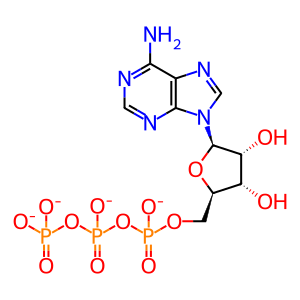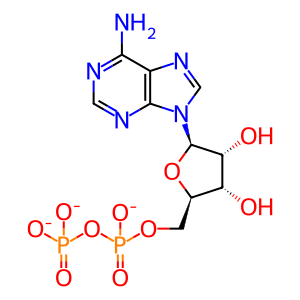Reaction: Autocatalytic phosphorylation of overexpressed FGFR2 variants
- in pathway: Signaling by FGFR2 amplification mutants
Amplification of full length FGFR2 is only weakly transforming in NIH 3T3 cells, reflecting the presence of a putative transformation-inhibitory region in the c-terminus of the protein (Itoh, 1994, Cha, 2009). C-terminally truncated variants of FGFR2 that are preferrentially expressed in cancer show more potent transformation potential (Cha, 2008; Cha, 2009). These variants lack a number of carboxy-terminal tyrosine residues, including Y770 and Y773. Loss of Y770 contributes to transformation by enhancing FRS2 binding to the C-terminally truncated variant. This suggests that in the context of the full-length protein the presence of Y770 restricts access of FRS2 to the receptor. Loss or mutation of Y773 impairs internalization and degradation of the receptor and promotes sustained signaling (Cha, 2009). Gastric cancer cell lines with FGFR2 amplifications appear to undergo ligand-independent signaling and are sensitive to inhibition with ATP-competitive inhibitors (Takeda, 2007).
FGFR2 amplifications identified in 4% of triple negative breast cancers have also been shown to be constitutively active and to have elevated levels of phosphorylated FRS2 in the absence of ligand. Consistent with this, shRNA knockdown or chemical inhibition restricts proliferation and induces apoptosis in these cells (Kunii, 2008; Turner, 2010)
FGFR2 amplifications identified in 4% of triple negative breast cancers have also been shown to be constitutively active and to have elevated levels of phosphorylated FRS2 in the absence of ligand. Consistent with this, shRNA knockdown or chemical inhibition restricts proliferation and induces apoptosis in these cells (Kunii, 2008; Turner, 2010)
Reaction - small molecule participants:
ADP [cytosol]
ATP [cytosol]
Reactome.org reaction link: R-HSA-2029989
======
Reaction input - small molecules:
ATP(4-)
Reaction output - small molecules:
ADP(3-)
Reactome.org link: R-HSA-2029989


